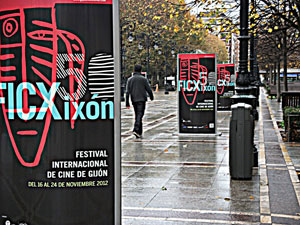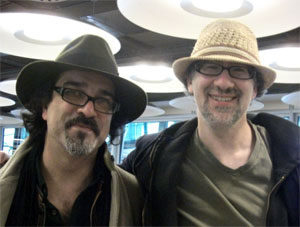
The Festival Internacional De Cine De GIJÓN, also known as FICXixon in Spain, is a wonderful festival in Spain that this year celebrated its golden jubilee, or 50th anniversary. On November 16-24, 2012, the festival celebrated in a suitably grand manner, starting with a red carpet event.
The festival opened with Spanish actress Leticia Dolera, and during the opening ceremony, the famous Asturian Spanish casting director Luis San Narciso was awarded the Nacho Martínez Award for his special achievements. Narciso found casts for such films as By My Side Again (Gracia Querejeta, 1999), The Sea Inside (Alejandro Amenábar, 2004), Volver (Pedro Almodóvar, 2006) and The Counselor (Ridley Scott, 2012).
The festival officially opened with the Romanian film Beyond the Hills (Dupa Delauri) by Christian Mungui and closed with an American independent filmmaker and Slamdance co-founder Dan Mirvish with his film Between Us. The festival highlighted the special role of cinema as a cultural and social influencer.
The festival involved different sections, or programming tracks. As usual, the Official Section was dedicated to drama; the section ANIMAFICX was for animation; the sections Rellumes, Enfants Terrible, Géneros Mutantes and La Crueldad Francesa were for horror films; the section Esbilla was reserved for Spanish film and Spanish Shorts; and the section Llendes was for Documentary Film; and there were specialized sections for retrospectives on the work of Iranian filmmaker Amir Naderi, Slovak filmmaker Juraj Jakubisko and Spanish-Canadian filmmaker Bruno Lázaro.
In addition to films from different countries and cultures, the Gijon International Film Festival cultures included The Shadow Dancer, directed by James Marsh, and four independent American films, including Mirvish’s Between Us, a kind of Who’s Afraid of Virginia Woolf film and a pretty dark story investigating friendships and what lies beneath them. Also shown were Todd Luise’s Hello, I Must Be Going, Adam Leon’s Gimme the Loot and Marshall Lewy’s California Solo, starring the always good Robert Carlyle.
In the spirit of 50 years of history of both cinema and the festival, the FIPRESCI Jury (Günter Jekubzik from Germany, Paula Bordonada from Spain and myself, Radmila Djurica, from Serbia) decided to award and celebrate brave women. To honor the courage of woman, our choice was The Patience Stone (Syngué Sabour) directed and adapted from the best-selling novel written by Atiq Rahimi and winner of the most prestigious book award in France (Goncourt Prize) in 2008.
The Patience Stone tells the story of a beautiful Afghan woman, who tries to protect her husband, who is in a coma and wounded, helpless but aware of everything. The war is taking place outside, and she clings to the hope that he will recover consciousness. She is brave and alone, sacrificing her safety, children and honor, facing the continuing potential of brutal violence. As he lies, unconscious, she tells him her deepest thoughts: about how, during their marriage she’d submitted to him and his family, neglecting herself and ending up alone and unhappy. She talks about her childhood, her frustrations, her loneliness, her desires, everything that husbands in the Middle East tradition do not acknowledge. So this paralyzed man unconsciously becomes “syngué sabour,” a magic stone which, according to Persian mythology, when placed in front of a person shields him from unhappiness, suffering, and pain, as she speaks all the words once unspoken in her marriage.
The Award of FIPRESCI at Festival Internacional de Cine de Gijon honored an absolutely spectacular performance by Iranian actress Golshifteh Farahani in The Patience Stone, where she portrayed a brave and strong Middle Eastern woman who turns her back on the patriarchal society and uses her husband’s condition to her advantage, fighting and winning against the hostile men around her. The Patience Stone is also about the true meaning of the word sacrifice and how women end up far too submissive at their own expense, quite often in patriarchal societies such as in the Middle East.
The Awards at Gijon Film Festival 2012
The International Jury of the 50th Gijón International Film Festival (consisting of Dmitry Glukhovsky, Ernesto Alterio, Lola Salvador, José Salcedo and Farid Bozorgmehr) has awarded the following prizes to the feature films participating in the Official Selection:
PREMIO PRINCIPADO DE ASTURIAS AL MEJOR LARGOMETRAJE or the Best Feature Film to the Japanese film, About the Pink Sky, by Keiichi Kobayashi. The film, made in black-and-white, was a technically engaging indie film.
PREMIO AL MEJOR DIRECTOR or the Best Director Award went to a Korean film, Barbie, directed by Lee Sang-Woo. The film depicted illegal child trafficking in the era of globalization.
The Franco-Afghan film The Patience Stone won the FIPRESCI Prize and the Young Jury Prize, as well as Best Actress (Golshifteh Farahani), and the Israeli film Epilogue nabbed Best Actor (Yosef Carmon) and Best Screenplay (written by the film’s director, Amir Manor).
The Bosnian film Children of Sarajevo won Best Production Design (Best Art Direction), and Beyond The Hills, directed by Romanian film director Cristian Mungiu, won the Jury Special Prize.
The International Jury of the ANIMAFICX Section of The 50th Gijón International Film Festival (consisting of Raúl García, Chelo Loureiro, Pablo Llorens Serrano and Luis da Matta) awarded the PREMIO ANIMAFICX or ANIMAFICX Prize to the film Le chat du rabbin by Joann Sfar and Antoine Delesvaux, as well as announcing a few Special Mentions.
For more awards to review and read about the festival, visit the official site: www.en.fic.gijon.es

Dan Mirvish and Atiq Rahimi

